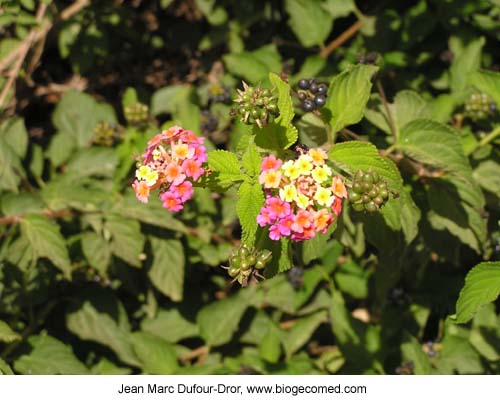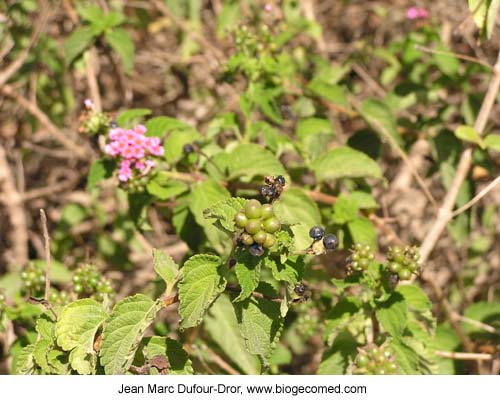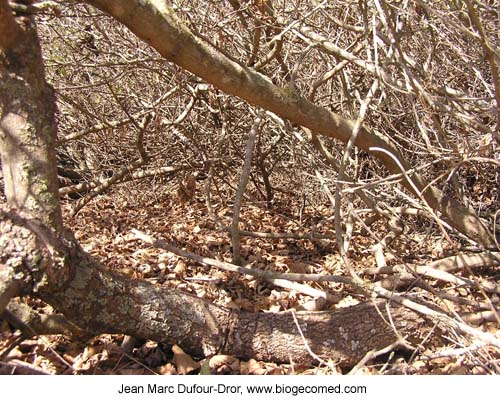|
General
Lantana camara L.
Verbenaceae
Life form: Evergreen shrub
En: Lantana, Red Sage, Fr: Lantanier
Provenance: Central and Southern America

Distribution in Israel
Several populations of Lantana camara have been recorded
in protected sites in Israel, e.g. in the Nature Reserves of
Tel-Itshak and Iris Argaman, as well as in the National Park
of Nahal Ha-Yarkon in the coastal plain. The species has also
invaded the internationally known Nature Reserve of Ein Guedi
and its surroundings on the shore of the Dead Sea.
The occurrence of Lantana camara in other protected areas
in Israel is currently under investigation.
Some individuals have also been found locally in open areas next
to irrigated plantations and orchards in the coastal plain and
in western Galilee.

Proliferation status
Although Lantana camara is considered one of the '100
of the World's Worst Invasive Alien Species' according to the
Invasive Species Speciality Group (ISSG) of the World Conservation
Union (IUCN) (Lowe
et al. 2000), this plant has not yet reached the status of
'invasive' in Israel, according to the terminology suggested
by Richardson et al. (2000). The main reason for this
is that when they occur in open areas, Lantana specimens do not
produce reproductive offspring in very large numbers; Lantana
camara is therefore, to date, 'naturalized' in Israel.
Lantana camara in Israel
Lantana camara was introduced in Israel prior to 1957.
The species has been introduced in Israel for ornamental purposes.
The local scale distribution pattern of Lantana in Israel suggests
that the plant is sensitive to low levels of soil water: The
specimens observed, even in nature reserves, are generally growing
close to irrigated agriculture fields or orchards. This presumed
abiotic constraint to the proliferation of lantana in Israel
should not be interpreted as a lack of further invasion threats
especially in wet habitats (springs, river banks, ponds, marshes,
etc.).
Therefore its removal, even in nascent foci, should be planned
all over the country without further delay.

Control
Individuals can be pulled out provided the roots are removed
in order to prevent resprouting. Cleared areas should be treated
with herbicides such as glyphosate in order to kill seedlings.
References
Morton J.K. (1994) Lantana, or red sage (Lantana camara
L., [Verbenaceae]), notorious weed and popular garden flower;
some cases of poisoning in Florida. Economics Botany 48:259-270.
Swarbrick J.T., Willson B.W.
& Hannan-Jones M.A. (1995) The biology of Australian weeds
25. Lantana camara L. Plant Protection Quarterly
10:82-95.
Totland Ø., Nyeko P.,
Bjerknes A.L., Hegland S.J. & Nielsen A. (2005) Does forest
gap size affect population size, plant size, reproductive success
and pollinator visitation in Lantana camara, a tropical
invasive shrub ? Forest Ecology and Management 215:329-338. |
